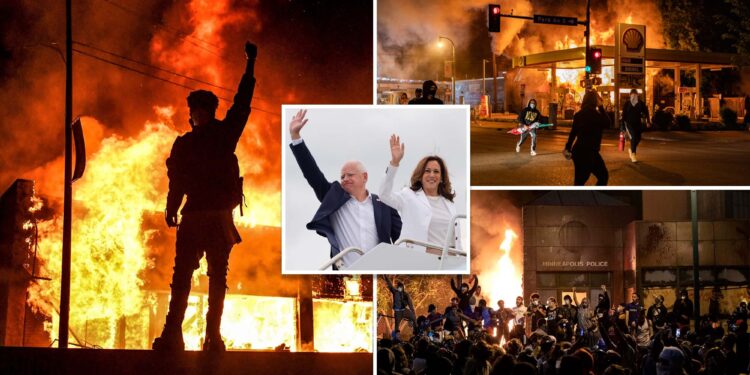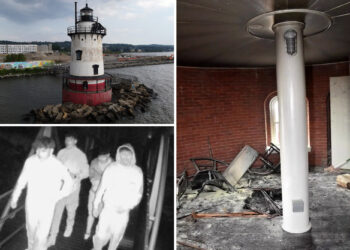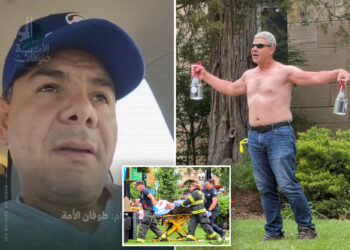
Kamala Harris and Minnesota Gov. Tim Walz’s fingerprints are all over the deadly riots that consumed Minneapolis and St. Paul in the summer of 2020 — their cheerleading and inaction giving cover to criminals as neighborhoods burned and hundreds of businesses were ransacked and destroyed.
In the wake of the murder of George Floyd, lawlessness reigned as city streets erupted in a nightmarish hellscape of violence and flames.
“The civil unrest that happened in Minnesota was unprecedented, it was a once-in-100-years thing. Nobody expected it, nobody planned for it,” Dr. Ali Barbarawi, a Minneapolis dentist who grew up in the West Bank, told The Post.
Crime skyrocketed – with murders jumping 75% in 2020 compared to the prior year, and then rising even more 2021. Killings have dropped, but are still 50% above 2019 levels.
Many of the businesses that were damaged were small, family-run operations, and Barbarawi — whose office was destroyed in the riots — said owners hoped they would one day be made whole after order was restored.
“People were expecting a lot more help from the government on a larger scale. It was a disaster and when disaster happens, people expect help from either the city, state or federal government,” he said.
“That didn’t happen much. There were some state-level grants but not for everybody, and not at a level business owners were expecting.”
During the riots, some business owners took desperate measures to keep their livelihoods safe from the raging masses, many described waiting for help that would never arrive.
Follow The Post’s coverage on Kamala Harris’ running mate Tim Walz:
As his state’s largest city was engulfed in flames, Walz held off on mobilizing the Minnesota National Guard for a full 18 hours after Minnesota Mayor Jacob Frey said he desperately needed at least 600 National Guardsmen to bring things under control.
When Walz finally decided to act the night of May 28, 2020, he sent only 100 guardsmen, a scathing post-mortem from the state’s Senate revealed later that year.
Those that did arrive did little to stop the carnage, according to Minneapolis residents.
Ricardo Hernandez, 44, owner of La Michoacana Purepecha ice cream shop at 701 East Lake Street, pleaded with the National Guardsmen to intervene as rioters doused the businesses next door with gasoline.
When they refused, he said he had to negotiate with the demonstrators himself.
“Walz should have had the National Guard out there sooner before the damage was done,” Hernandez said.
“He told the National Guard to stand still.”
To avoid the same fate for his own shop, he stayed there so he could stand guard.
“If I wasn’t there, my business would have been burned down.”
David Hann, the chairman of the Minnesota Republican Party, told The Post he believes Walz was reluctant to act during the Black Lives Matter protests because he didn’t want to betray left-wing progressives.
“I think as governor of the state and relying on that progressive base, he knows that that’s where the political power is, in the Democratic Party. So he can’t… abandon that without risk of hurting his status as a political leader,” he said.
“The city has still not recovered.”
Equally troubling, the governor — who took office in 2019 — was also accused of sharing confidential information with his teenage daughter, including law enforcement plans and National Guard response times.
“The guard can not be sent in within minutes,” Hope Walz, who was 19 at the time, tweeted earlier in the evening on May 28, 2020, noting that, “it takes time for them to deploy because they come from all over the state.”
She later unambiguously added, “To be clear, the national guard will not be present tonight.”
Back at the stately governor’s residence in St. Paul, Walz’s wife Gwen recounted throwing open the windows to catch deep whiffs of the destruction in the city.
“I could smell the burning tires, and that was a very real thing,” she recalled in a sit-down interview with KTSP in June 2020.
“I kept the windows open as long as I could because I felt like that was such a touchstone of what was happening,” she added.
Meanwhile, Vice President Harris was fanning the flames through social media, encouraging followers to donate to the Minnesota Freedom Fund (MFF) “to help post bail for those protesting on the ground in Minnesota” in a June 1, 2020 post.
And donate they did, to the tune of some $35 million by June 15.
But the MFF, which claims on its website to be a champion of the downtrodden and indigent, has also spent hundreds of thousands bailing out violent criminals, according to local reports.
“I worry about the victims, the MFF and people pushing that ideology are worried about the offender,” said Minnesota state Rep. Paul Novotny, a retired cop and GOP leader of the Public Safety Finance and Policy Committee.
“I’m not against bail, bail is guaranteed in the state constitution, but our founders put it there … to ensure people show up for their next court hearing and to encourage them not to reoffend,” he said.
“If you commit a violent crime and there’s no consequences for you, if you have no skin in the game, there’s no incentive for you not to reoffend.”
The fund reportedly posted $100,000 bail for Darnika Floyd, who was charged with second-degree murder and accused of stabbing a man to death after he said he wanted a threesome with her and a friend. She was sentenced to prison in 2021 on a charge of aiding and abetting murder.
It also stepped up for Christopher Boswell, a twice-convicted rapist who was charged with kidnapping and sexual assault who was released on $350,000 bail after the fund put up the cash for him. He was sentenced to prison in 2023 for criminal sexual conduct.
Lionel Melaki Timms, 36, was bailed out by MFF for $10,000 after committing a felony third-degree assault aboard a bus in Bloomington. Less than a month later, he was re-arrested after he nearly beat a local bar manager to death, leaving the victim with a traumatic brain injury, authorities alleged.
“By bailing out dangerous criminals, [MFF] has brought pain and distress to victims and all Minnesotans who no longer feel safe in their communities due to the rise of crime,” Republican Minnesota state Rep. Mary Franson told The Post.
Franson authored the Bail Abatement Nonprofit Exclusion, or BANE act, which forbids nonprofits like MFF from paying criminal suspects’ bail. She presented it as an amendment in 2021 and again in 2022 but it never got off the ground, due in part to a “stellar” lobbying campaign MFF waged in opposition.
The seven-term state rep said crime in the Twin Cities “skyrocketed” in the wake of the George Floyd riots, police ranks have sharply dipped amid a hostile climate towards law enforcement. She added that that even the grounds of the state capitol in St. Paul are no longer safe for lawmakers to walk alone at night.
“MFF has made Minnesota less safe. Tim Walz and Kamala Harris have ruined public safety in Minnesota, and you can see that through our crime stats,” she said, adding she has “no doubt” the same blueprint would be rolled out nationwide under a Harris-Walz administration.



























